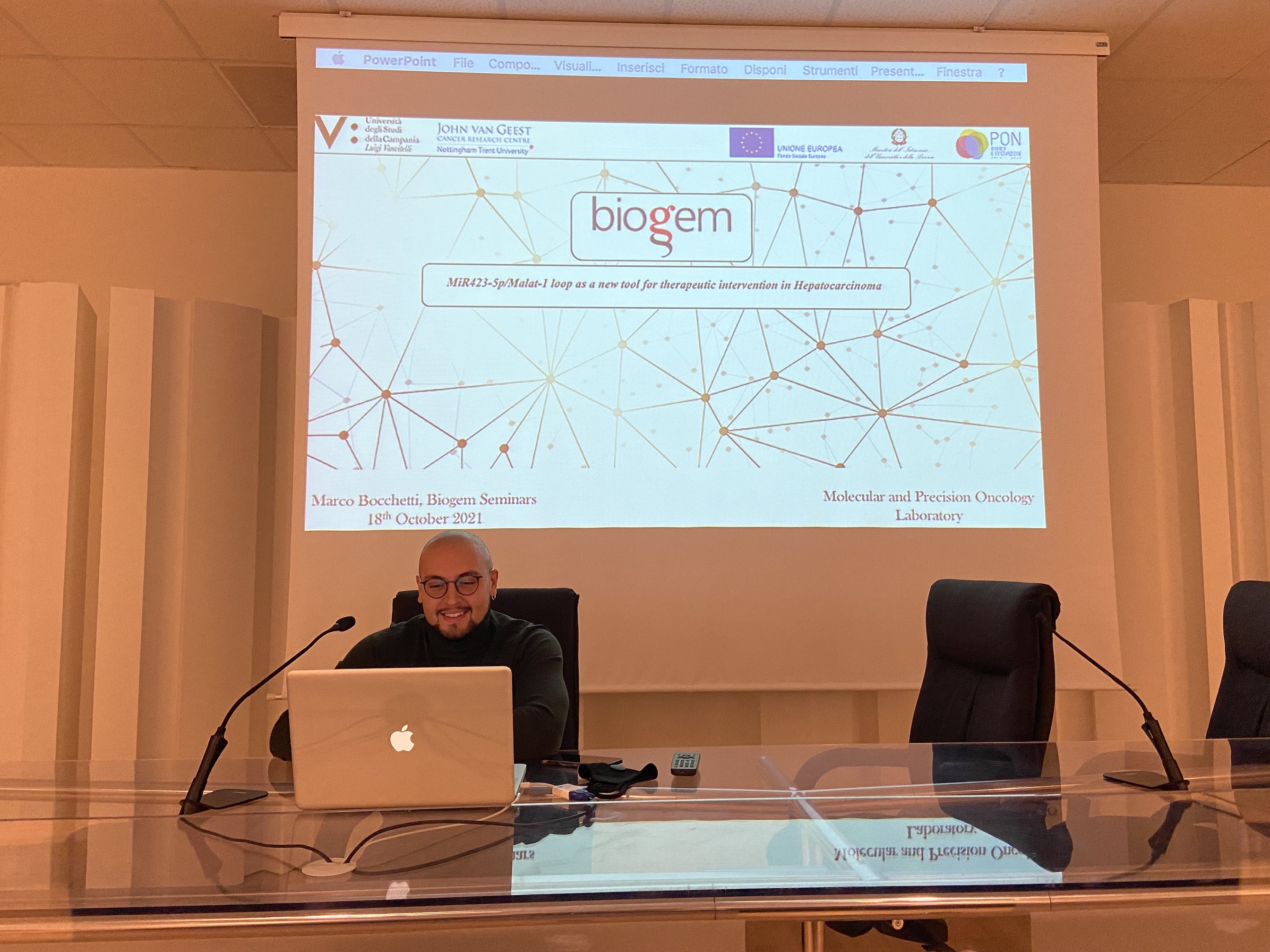MOLECULAR AND PRECISION MEDICINE
Director Prof. Michele Caraglia
Research areas
The Molecular and Precision Oncology laboratory, directed by Prof. Michele Caraglia and coordinated by Dr. Marianna Scrima, focuses on the characterization of circulating miRNA signatures, with the aim of suggesting new diagnostic and therapeutic approaches. The main goal is to determine a circulating miRNA signature with innovative nanosensors, for the diagnostic and prognostic determination of squamous cell carcinoma of the larynx and more generally of the tumors of the head and neck area. This new technology will be applicable for any other neoplasia of which there are known circulating miRNA signatures to be determined in real time in the patients' blood through a nanotechnological device easy-to-use directly at the point of care (i.e., the patient's bed), without the need for complicated laboratory procedures. The biological role of these miRNAs in human cancers is also studied in order to identify new therapeutic strategies, based on the regulation of miRNA expression in cancer cells, through the use of nanotechnological approaches. The laboratory is also able to perform genotypic characterization in next generation sequencing (NGS) of human cancers, such as colorectal, breast, bladder, lung and hepatocellular carcinoma. These molecular features are useful for understanding the biological mechanisms that guide their development and determine their response to treatments.
Other projects currently in progress are the genetic and epigenetic characterization of single tumor cells, through single cell (nuclei) genome sequencing techniques (within the squamous cell tumors of the head and neck area) and the determination of the prognostic and predictive impact of individual cellular genetic signatures responses (Dr. Federica Melisi, Dr. Alessia Maria Cossu, Dr. Marco Bocchetti).
Another project is currently in progress, in collaboration with the Biogem Bioinformatics laboratory. This project aims to identify the fragmented circulating tumor DNA and the methylation of regions of circulating tumor DNA from plasma of patients affected by various neoplasms (colon, breast, melanoma, lung, head and neck tumors, bladder) in order to determine signatures capable of early diagnosis of cancer and of predicting survival and response to treatments. The design of a bioinformatics algorithm will make possible to predict the presence of the neoplasm, the primary tissue of origin and the prognostic characteristics.
Finally, in collaboration with the Biogem Translational Nephrology laboratory, there is a project in progress about the characterization of circulating miRNAs in the serum of renal transplant patients who develop post-transplant neoplasms, with the aim of identifying a predictive signature (Dr. Piera Grisolia, Dr. Cinzia Graziano, Dr. Clara Iannarone).
Other projects presently in progress:
- Study of the effects of hypoxia on the genotypic and epigenetic characteristics of human mesothelioma (Dr. Marco Bocchetti, Dr. Cinzia Graziano).
- Genotypic characterization of thin melanoma: impact on prognosis and response prediction (Dr. Federica Melisi, Dr. Lucia Pasquale).
- Study of the cross-talk between micro-RNA and long non coding RNA in human hepatocellular carcinoma (Dr. Marco Bocchetti).
- Characterization of a new antibody directed against a specific tumor antigen of human mesothelioma (Dr. Marco Bocchetti).
- Characterization of the effects of radiotherapy on gene expression in glioblastoma cells (Dr. Federica Melisi, Dr. Lucia Pasquale).
- Study of the genetic susceptibility to neoplastic cachexia (Dr. Lucia Pasquale).
- Study of genetic and epigenetic susceptibility to SARS-Cov-2 infection (Dr. Alessia Maria Cossu, Dr. Clara Iannarone).
Technologies used / developed
The Molecular and Precision Oncology laboratory is equipped with technology for molecular and cell biology. In particular, it has clean rooms for cell cultures with safety devices for the manipulation of viral strains; a confocal microscope in white light and fluorescence, equipped with a CCD camera, FACS; equipment for gene sequencing of Next Generation Sequencing (PGM, Ion GeneStudio™ S5 System, Illumina Next 550), QuantStudio 7 Flex Real-Time; RT-PCR equipment (Pyromax and Therascreen); FACS cell sorter BD for the isolation and collection of single cells, based on their phenotypic characteristics.
Services offered
The laboratory aims to offer the genotypic characterization of colorectal and breast carcinomas of samples from patients affected by these diseases, in order to develop a collaborative network between the main universities and hospitals in Campania. Thanks to a bioinformatics tool that optimizes and simplifies the annotation of sequence data, the analysis obtained by evaluating quality score and frequency parameters would allow for the development of a personalized medicine. In this way, therapeutic treatments could be developed based on the characteristics of each patient, with the right combination of drugs (based on each patient’s genetic profile and the profile of the disease) with the appropriate dose and at the right time.
Research
Internal seminar

